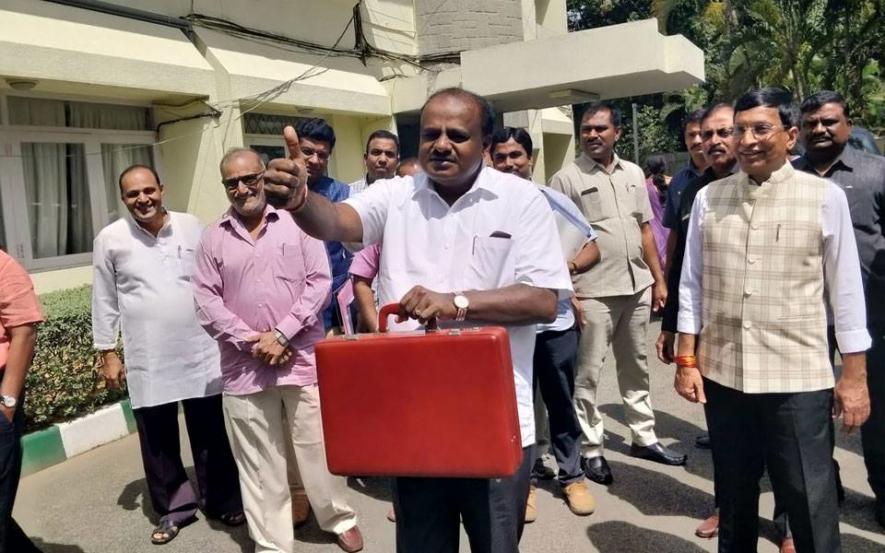Karnataka Farmers Displeased With Budget, Plan for Protest

Soon after the presentation of its maiden budget, declaring a Rs 34,000 crore loan waiver, HD Kumaraswamy government in Karnataka faces a fresh set of censures from farmers. The farmers have now decided to launch a state-wide protest demanding full waiver, irrespective of the loan amount and size of land holding, as the chief minister had declared in the run-up to elections. In its election manifesto, JD(S) had promised writing off all the farm loans within 24 hours of coming into power.
Out of the total existing loan that amounted Rs 1.20 lakh crore according to farmers’ organisations, the new loan waiver scheme covers only Rs 34,000 crore. Questioning the government over the reimbursement of remaining the 86,000 crore, Karnataka Rajya Raitha Sangha (KRRS) said that both the Centre and state governments have to waive these loans, otherwise they would be compelled to hold massive protests.
On July 9, a preparatory protest will be held in Bengaluru, to press the government to waive all existing loans. Again on July 21, they KRRS is scheduled to hold a massive rally of farmers in Haveri to reiterate the demands for a blanket waiver.
In his debut budget, Kumaraswamy announced the waiver of all farm loans up to Rs 2 lakh, availed till December 31, 2017. The JD(S)-Congress coalition government will reimburse Rs 10,500 crore to banks for the loan waiver this year, and will be generating funds for the payment through an increase in taxes on fuel, electricity, motor vehicles and alcohol, as announced in the budget. In the second phase, an incentive of Rs 25,000 would be distributed to the 27.67 lakh farmers who repaid their loans on time ‘to prevent complaints that only defaulters have benefited.’
The displeased farmers’ organisation clearly stated after the budget that it “lacks a long-term vision for agriculture”. The situation in Karnataka is different from many other states. The state has witnessed either drought or floods in 11 of the last 16 years. The farming community in the state suffered a through a lot during these years, and they will take a few years to overcome the financial distress suffered from each natural calamity, said Nagendra, from KRRS.
The farmers have demanded that non-institutional loans should also be waived. Loans with high interest rates were being lent from informal establishments and farmers ended up paying about 60 percent interest to these money lenders, according to farmers’ organisations. Apparently, this was one of the focuses of the bill that had been formulated by the farmers across the country, during the Kisan Mukti Sansad in November 2017.
The bill, titled “Farmers' freedom from debt bill 2017”, focuses on two aspects: “Immediate Debt Relief which means the waiver of existing loans, and protecting farmers from future debt trap which is to be done through the establishment of a Farmers’ Debt Relief Commission. While talking about the non-institutional loans, the bill proposes that immediate Debt Relief, debt-swapping be implemented by the government as per due process to convert non-institutional loans into institutional loans, and thereafter a loan waiver be provided for the bank loans.”
Earlier on June 19, soon after Kumaraswamy paved his way to Chief Ministers’ office, the farmers had protested demanding a loan waiver of all existing loans till May 2018. During the protest, the farmers had met the CM with their charter of demands.
The demand charter included, “waive all existing farm loans till May 31, 2018, don’t differentiate between small, marginal and large farmers in crop loan, don’t exclude farmers for defaulting on loan repayment, the nodal officer should collect loan details from banks and deliver it to farmer, allow consideration of farmers who have filed IT of more than 4 lakh for a waiver to nodal officer’s discretion, exclude legislators, MPs, current and former members of cooperative societies, consider farm loans availed from banks within city limits for a waiver, waive off gold loans taken for agricultural purposes, consider all loans are taken for tractors, farm development, equipment and horticulture and, finally, waive off all loans related to farmers.”
Though, in June 2017, the then Siddaramaiah-led government had announced a Rs 8,165 crore scheme in the state to waive crop loans of around 22 lakh farmers, with a cap of Rs 50,000 per farmer, the Union Finance Minister Arun Jaitley had ruled out the scheme, pointing out that the central government will adhere to its fiscal targets, and hence, the state government proceeded to borne the waiver cost.
As per the data available with the Reserve Bank of India (RBI), Karnataka is one of the top five states that accounts for highest agricultural debts in the country. Tamil Nadu (11.4 percent), Uttar Pradesh (11.3 percent), Maharashtra (9.0 percent), Karnataka (8.7 percent) and Andhra Pradesh (8.5 percent) are the top five, which together contribute nearly half of the total agriculture credit.
Since 2014, nine states have announced farm loan waiver, accounting the total cost to Rs 1.9 trillion.
In 2014, Andhra Pradesh chief minister N. Chandrababu Naidu had passed a Rs 43,000 crore scheme, Development of Women and Children in Rural Areas (DWCRA), for farmers. Under the scheme, loans up to Rs 1.5 lakh were waived. During the same year, the K. Chandrasekhar Rao-led government in Telangana too announced a farm loan waiver of Rs 17,000 crore, with a cap of Rs 1 lakh per family. The government had paid all the dues by April 2017 and about 3.6 million families got the benefits of the waiver.
Following Andhra Pradesh and Telangana, in 2016, the then Tamil Nadu chief minister J. Jayalalithaa announced a farm loan waiver worth Rs 5,780 crore, clearing outstanding principal, interest and penal interest of the farmers who had taken loans from cooperative banks until 31 March 2016.
Uttar Pradesh chief minister Yogi Adityanath also declared a farm loan waiver of Rs 36,359 crore, writing off the debt of up to Rs 1 lakh for small and marginal farmers in his maiden budget in 2017, as “promised” before coming to power. But, the government only mocked the farmers with certificates of waivers worth Rs 1-100.
In Maharashtra, the continuous protests and struggles of farmers had forced the Devendra Fadnavis-led government to announce a Rs 30,500-crore loan waiver to benefit 89 lakh farmers in June 2017. The maximum limit to avail the loan was set at Rs 1.5 lakh. In addition, a concession - a one-time settlement facility for the farmers having loans more than Rs 1.5 lakh - had also been announced.
Recently, Punjab and Rajasthan too have joined the states that had announced loan waivers earlier. Fulfilling his pre-poll promise, Punjab Chief Minister Captain Amarinder Singh announced a Rs 10,000-crore crop waiver clearing crop loans of up to Rs 2 lakh for small and marginal farmers, who own up to 5 acres of land. In Rajasthan, during June 2018, chief minister Vasundhara Raje announced a Rs 8,500 crore farm loan waiver promising to clear the debts of small and marginal farmers, worth up to Rs 50,000.
Last in the list, the Left Democratic Front (LDF) government in Kerala, extended the period of the existing loan waivers. Loan waiver for farmers in Wayanad, the district that witnessed deep agrarian crisis, has been extended to March 31, 2014, and for other districts, it is October 31, 2011. In its election manifesto in 2006, the LDF had put forward a farm loan waiver scheme and the then government, 2006-2011, in Kerala had become the first in India to create a farm loan waiver scheme.
Also Read: Karnataka’s Expenditure on Education and Health is Starkingly Low
Get the latest reports & analysis with people's perspective on Protests, movements & deep analytical videos, discussions of the current affairs in your Telegram app. Subscribe to NewsClick's Telegram channel & get Real-Time updates on stories, as they get published on our website.
























